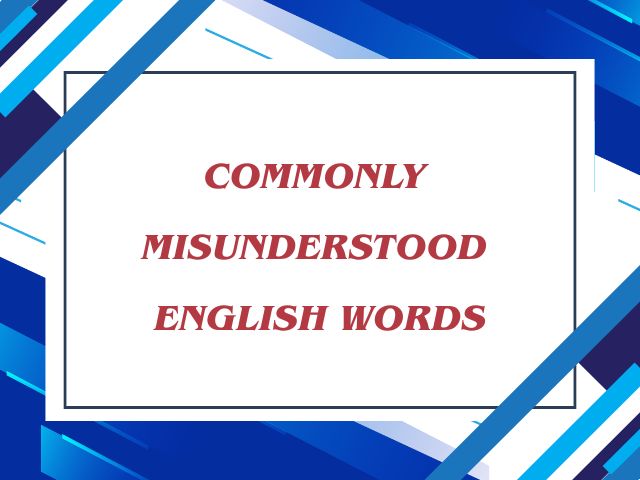Cách Sử Dụng Giới Từ - Preposition
Giới từ, hay còn được gọi là Preposition trong tiếng Anh, đóng một vai trò quan trọng trong việc sử dụng ngôn ngữ anh văn giao tiếp quốc tế. Giới từ giúp xác định mối quan hệ không gian hoặc thời gian giữa các từ và cụm từ trong câu.
Cách sử dụng đúng giới từ là một kỹ năng quan trọng cho việc hiểu và sử dụng tiếng Anh một cách chính xác. Việc chọn sai giới từ có thể làm thay đổi ý nghĩa hoặc dẫn đến hiểu lầm trong giao tiếp.
Bên cạnh việc biết cách sử dụng các giới từ thông qua các qui tắc cơ bản, học viên anh văn giao tiếp quốc tế cũng nên hiểu rõ về ngữ cảnh và ý nghĩa của các giới từ trong từng trường hợp cụ thể. Việc nắm vững cách sử dụng giới từ sẽ giúp bạn truyền đạt ý kiến và thông tin một cách chính xác và tự tin trong giao tiếp tiếng Anh quốc tế.
(*) Tham khảo bài viết Các cặp giới từ dễ nhầm lẫn trong Anh văn giao tiếp
Prepositions (1)
Noun/adjective + preposition
3. Sau động từ be, tính từ có thể đi kèm với preposition (giới từ) + noun phrase (cụm danh từ) [danh từ hoặc đại từ]:
adjective preposition noun (phrase)
afraid of dogs
sorry for the mess
pleased with her results
My brother is afraid of spiders.
Are you sorry for your mistake?
She was pleased with the present.
Sau động từ be, tính từ có thể đi kèm với một mệnh đề (clause) hoặc to + verb (động từ). Trường hợp này sẽ không có giới từ:
Are you sorry (that) you made a mistake?
She was pleased that we came early.
She was pleased to see her cousins.
I was afraid to tell them the truth.
Nếu sau giới từ là động từ, ta luôn sử dụng động từ ở dạng –ing:
I’m tired of telling them to be careful.
Who is responsible for checking the identity cards?
4. Một số danh từ đi kèm theo preposition + noun phrase:
noun preposition noun (phrase)
reason for the party
belief in ghosts
effect on my situation
The festival was the reason for the traffic.
I don’t take their belief in magic seriously.
Cars have a serious effect on the climate.
Thực hành văn phạm
8. Có nhiều kết hợp giữa adjective (tính từ) + preposition (giới từ) cho phép ta nói về cảm xúc:
angry/across with disappointed with annoyed with pleased with
excited about curious about happy about sorry about
worried about tired of afraid of fond of
sick of proud of jealous of sorry for
surprised at/by astonished at/by interested in
Are you afraid of snakes? ~ Yes, I’m a bit worried about our holiday to Australia! ~ Oh don’t worry. If you see one, I think you’ll be more curious about them than scared. I was disappointed with my results. They were surprised at my refusal.
9. Ta có thể sử dụng adjective + preposition khi nói về thái độ của người khác (cách họ nói hoặc cảm nhận):
right/wrong about honest about polite to ready for
gentle with responsible for rude to
I think I’m ready for the test. ~ Remember to be polite to the examiner.
10. Ta cũng có thể sử dụng adjective + preposition khi nói về tính tương tự:
identical to the same as similar to different from
Your eyes are the same as your mother’s, but your hair is very different from hers.
11. Ta có thể sử dụng noun + preposition khi nói về ý kiến, niềm tin hoặc cảm xúc của một người về người khác, vật khác:
attitude to/towards reaction to hope of opinion of/about
respect for advice on belief in
I don’t have a very good opinion of David. He has a very bad attitude to work and has very little respect for his colleagues.
12. Ta cũng có thể sử dụng noun + preposition khi nói về sự kết nối hoặc mối quan hệ giữa hai vật:
reason for effect on trouble with difficulty in/with
result of cause of rise/increase in fall/reduction in
An increase in the price is the cause of the fall in sales.
Bài tập:
D. I’m worried about George
Complete the conversation using the correct prepositions.
JACK I’m worried (0) about George. He’s usually so polite (1) . . . . . . . everyone, but yeaterday he was so rude (2) . . . . . . . me when I saw him! It’s just not like him.
LISA That sounds very different (3) . . . . . . . the George that I know. Can you think of a reason (4) . . . . . . . him to be like this?
JACK No, I was going to ask if you knew why his attitude (5) . . . . . . . me had changed. Do you think I should talk to him? What’s your advice (6) . . . . . . . what I should do next?
LISA Maybe it’s his new job. I think he was having trouble (7) . . . . . . . his boss, and he’s responsible (8) . . . . . . . a whole team of people. He might just be tired (9) . . . . . . . working so hard. He was really cross (10) . . . . . . . his boss for making him work last Saturday: it was his birthday!
JACK His birthday? Are you sure you’re right (11) . . . . . . . that? I thought it was next week! No wonder he’s annoyed (12) . . . . . . . me. I forgot his birthday!
E. A new job
Complete Kasia’s email to her friend, Andy, using the prepositional phrases from the box.
advice on at home by bike different from effect on
happy about interested in into town on holiday on the corner
on the way polite to ready for reason for responsible for
Hi Andy,
I tried to ring you yesterday, but you weren’t (0) at home. Did you go (1) . . . . . . . . . . Did you go (1) . . . . . . . . . . with Gemma? I remember you saying that you were (2) . . . . . . . . . . that new Italian film.
Well, the (3) . . . . . . . . . . this message is to tell you about my first day at my new job. It’s very (4) . . . . . . . . . . my old one. I was (5) . . . . . . . . . . a lot of hard work on my first day, and didn’t know how welcoming the people would be, but everyone was very (6) . . . . . . . . . . me and very friendly. The office is (7) . . . . . . . . . . of Prince Street and I’m really (8) . . . . . . . . . . the fact that I can get there (9) . . . . . . . . . . I’m sure cycling every day will have a good (10) . . . . . . . . . . me – I have to cycle up a big hill (11) . . . . . . . . . . there, so I’m hoping to get fit!
I’m going to be(12) . . . . . . . . . . all the new customers, and my boss has offered to give me some (13) . . . . . . . . . . how to keep them happy! I’ll let you know how the week has gone on Saturday, before you go (14) . . . . . . . . . . to France.
Bye for now,
Kasia
Đáp án:
D.
1. to 5. to/towards 9. of
2. to 6. on 10. with
3. from 7. with 11. about
4. for 8. for 12. with
E.
1. into town 6. polite to 11. on the way
2. intereated in 7. on the corner 12. responsible for
3. reason for 8. happy about 13. advice on
4. different from 9. by bike 14. on holiday
5. ready for 10. effect on
Nguyen Minh Son (09.09.2012)




